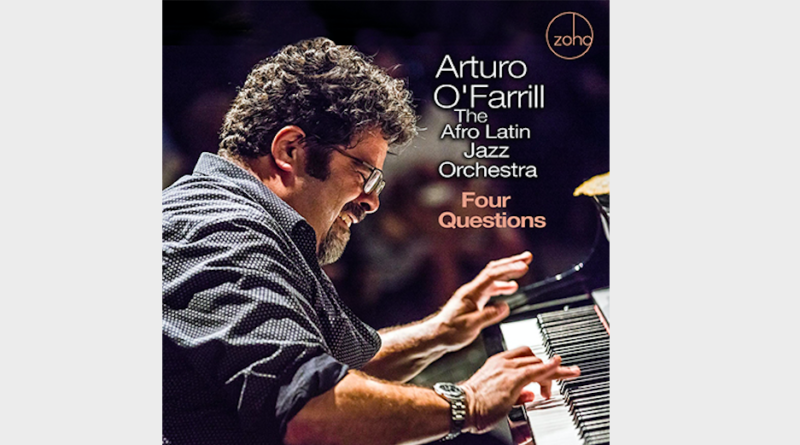INTERVIEW: With ‘Four Questions,’ Arturo O’Farrill finds inspiration, not just of the musical kind
Image courtesy of artist / Provided by ZOHO’s official website.
Arturo O’Farrill, who heads The Afro Latin Jazz Orchestra, has always brought the real world into his musical compositions, and that’s especially true of his latest release, Four Questions, featuring well-known academic Dr. Cornel West. The album was met with acclaim in 2020 and received a Grammy nomination for Best Latin Jazz Album.
The title of the album is pulled from the original composition featuring West on the album. The 16-minute piece pairs the academic’s voice with the measured musical musings of the orchestra. Surrounding this central tune are other songs that speak to the versatility of O’Farrill’s creative output, including “Baby Jack,” “Jazz Twins,” “Clump, Unclump” and the “A Still, Small Voice” series.
“What happened was I had been very interested in Dr. West’s speaking for many, many years,” O’Farrill said in a recent phone interview. “You can’t help but be aware of Dr. West, and periodically he would come to a show. And I’d see him in the audience.”
Eventually their two creative circles overlapped when O’Farrill was asked to be on a panel discussion about revolution and faith at Riverside Church in New York City. The musician was chosen, he believes, because he has always been socially and politically outspoken, sometimes much to the chagrin of others in his line of work. When the Riverside Church discussion happened — a few years ago now — O’Farrill was struck by West’s oratory in person.
“That was the first time I heard Dr. West speak live, and as he was speaking, I couldn’t help but feel like I was watching a great, great performer, a great jazz performer,” he said. “So I decided that I wanted to write him a concerto. I tried to get a hold of him, and he’s very busy. Of course, he has a lot of gatekeepers, but I asked my friends over at Revolution Books if they could somehow find a way for me to meet him.”
The two eventually met in person at a rally, and again, West’s speech electrified O’Farrill. He knew a collaboration needed to happen. “I mean, people were in tears in the audience,” he said. “The next thing I knew they asked me to speak, and so I had to follow Dr. West, which was kind of scary. But he was very kind.”
After the event, the two touched based — finally — and O’Farrill laid his plans on the table, and much to his surprise, West agreed to the collaboration. The idea was for the academic, who has held professor positions at many top-rated institutions, to talk about The Souls of Black Folk, the important work of African-American literature by W. E. B. Du Bois.
“It really talks about many of the themes that he touches on, which is the life and the importance of the intellectual and the stance with which one deals with oppression and deception and cruelty,” said O’Farrill, who teaches at the Herb Alpert School of Music at UCLA. “So I did a lot of research and presented Dr. West with a piece that I wrote called ‘Cornel West Concerto’ and asked if he would perform it with us, and I was lucky enough to get the Apollo Theater to commission it. And sure enough out of the blue one day I found myself on stage with Dr. West at the Apollo Theater performing the ‘Cornel West Concerto’ based upon these four questions that W. E. B. Du Bois writes about in The Souls of Black Folk. … It may be one of the most satisfying things I’ve ever done. It’s a real marriage of music and conviction.”
When O’Farrill composed the piece and then performed with West, there was a firm commitment of using the words of the past to comment on the realities of the present. That was the idea … and then George Floyd was killed in May 2020, sparking a resurgence in the Black Lives Matter movement.
“We didn’t plan for this to be a year of racial reckoning,” O’Farrill said. “I think that the moment for 2020 and Black Lives Matter was imminent. It was imminent. It was only a matter of time before a cruel murder of someone like George Floyd would be captured on video, and it would enrage people of good faith, good cheer, people across all socio, economic, racial, ethnic, religious and ideological divides. It was inevitable that people would come together to demand a better response to years and years of this kind of treatment.”
O’Farrill has no problem speaking out about the issues that matter most to him. He has done this throughout his career, winning over many fans and sometimes furrowing a few brows. The musician, who is a skilled pianist, said that he didn’t even understand his purpose until he started writing, performing, speaking and composing about issues that touch upon his deepest convictions.
“There are huge institutions that are socially conscious, have embraced my music and what I try to do with it, so in a way I became more true to myself as an artist when I started writing about the things that I really believed,” he said. “I think it’s really important to connect your art to people, to communities, to global communities. I think it’s really important. You can be an abstract artist. You don’t have to write about specific issues, but to care about humanity, to care about the issues that [go] across all kinds of divides, that’s really important. That’s definitely one of the things that also underlies my work. … We really forget that music is meant as a way to bring the world together to heal.”
By John Soltes / Publisher / John@HollywoodSoapbox.com
Arturo O’Farrill and The Afro Latin Jazz Orchestra, featuring Dr. Cornel West, recently released the album Four Questions on ZOHO. Click here for more information.

